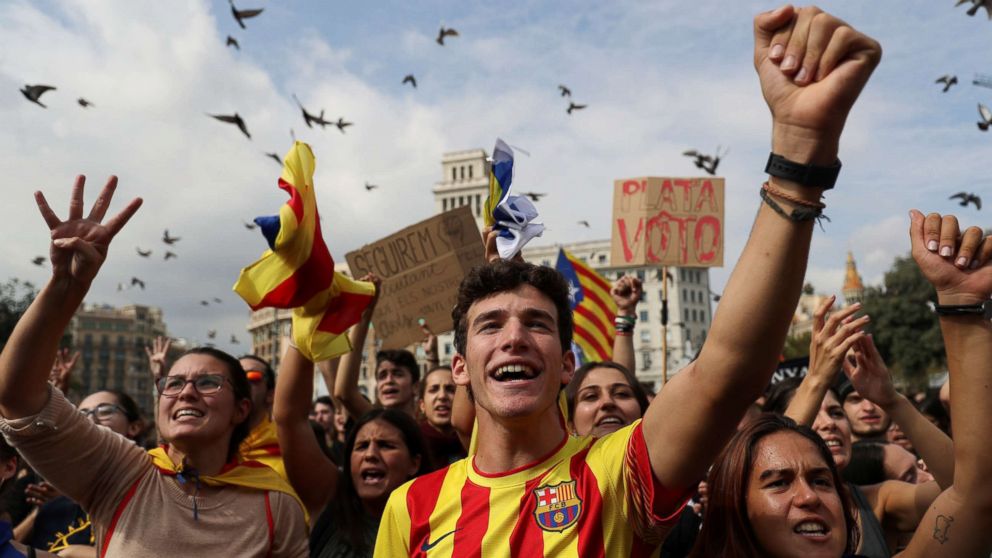Catalan leaders' uncertain path after the region's vote for independence
BARCELONA -- The day after more than two million Catalans voted in favor of independence in a chaotic and violent referendum, the streets of Barcelona were lined with Catalonian flags as the region’s leaders planned their next moves.
In meetings throughout the day, Catalonian officials sought a path to realize a newly established nation free from Spain. But it will not be easy, since the Spanish courts and federal government, run by Spanish Prime Minister Mariano Rajoy, have said they will never negotiate over what they called "illegal" elections.
In Barcelona, the capital of the Catalonia region, the streets were full of tourists and life seemed to go on as usual, with the addition of Catalan flags everywhere. In kiosks spread throughout the city, an abundant supply of t-shirts read, "Catalonia is not Spain."
"I am nervous, but I am not afraid," Josep Trurull, a 39-year-old artist from Barcelona, told ABC News. "Now they have to hear our voice."
Images of Spanish National Police beating voters were widely viewed in a negative light and Madrid needed to play it safe to avoid alienating the people further.
Trurull said the images of the beatings pushed him to support independence.
"They were beating people with flowers in their hands," he said.
This morning, Spanish Interior Minister Juan Ignacio Zoido announced that 10,000 national police officers would remain in Catalonia and more troops may be sent in the future, in order to prevent the independence movement from going further.
At Catalonia’s parliament, regional leader Carles Puigdemont said Sunday that Catalans had won the right to have their own state.
Madrid has several options in its quest to stop Catalonia’s secession.
Spanish Minister of Justice Rafael Català said on Spanish television today he was prepared for any situation, including imposing emergency laws. In an emergency situation, Spain could take administrative control of Catalonia. But such a move could again lead to a violent confrontation.
Spain can also, as it has before, say that it has the right to take action in the region "under the law" because Catalonia has violated the law.
Catalonia is far from obtaining independence for other reasons, as well. Outside countries and entities are not likely to recognize Catalonia as an independent state.
Although the European Union condemned the Spanish police’s violence, the EU has said that, for now, the fight is an internal Spanish matter.
The Catalonian government has asked the EU to mediate the dispute between it and Madrid.
"There is no button for independence," Puigdemont said Sunday. "We do need mediation."
Over the last few weeks, Catalans have shown they can mobilize people and that they can protest peacefully. A general strike has been called for Tuesday –- in which the region’s world-famous FC Barcelona soccer team has said it will participate. Puigdemont said that, on Wednesday, he will present the final results of the referendum to the Catalan parliament, which he will likely lead to a formal declaration of independence.
"We proved we can mobilize for our country," Nicolau Jaume, a 45-year-old employee of Catalonia’s justice department, told ABC News. He said he had never considered himself Spanish.
"We are not exhausted, but [are] enthusiastic," he said. "We believe in our government."
Though the independence movement has shown a strong voice, many questions about whether it's possible for Catalonia to become independent remain. But that has not hampered their spirit.
"My grandparents would be proud of us," Nuria, a 17-year-old wrapped in a Catalonia flag in Barcelona told ABC News. "Yesterday I could not stop crying, not just for me, but for the people of Catalonia."




